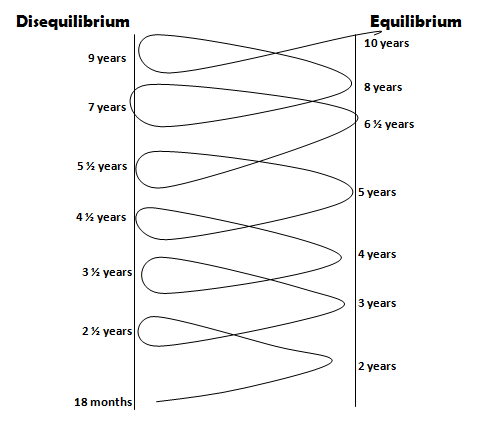Many of us take comfort in the phrase, “It’s just a phase.” It helps us deal with middle of the night crying spells, hunger strikes and temper tantrums. But some behaviors are only recognized as phases after they are gone. We might fret and worry about concerning behaviors or patterns and then wake up one morning and realize they are gone. Parenting is definitely not predictable.
Or is it?
Child psychologist, Louis Bates Ames, co-authored a book with Francis L. Ilg entitled Child Behavior: The Classic Child Care Manual from the Gesell Institute of Human Development. In it, they explain a theory of child development that helps shed some light on these phases.
Basically, they assert that a child’s development is typically marked by vacillations between equilibrium and disequilibrium at different, but somewhat predictable, ages.
Below is a pictorial representation of this concept:

As you can see from this image, as the child ages, he or she is perpetually on a path toward or away from equilibrium. This means that your kid might be a mess just because he is 4 ½. Keeping this knowledge tucked into your back pocket will help you weather the storms so common to child development. It can be very comforting to know that “this, too, shall pass.”
The other day, I heard some moms talking about a few of the things their children have “outgrown;” things like excessive hand washing, stomach aches before school, refusing to separate, and more. The problems seemed to find a way to work themselves out. Kind of like the story my dad tells of when he was a kid and got the back end of a 22 shell imbedded in his knee (you’d have to ask him to explain how that happened). He kept quiet about it (probably to avoid getting into trouble), and it eventually just worked its way to the surface and out of his skin.
Now, please don’t get me wrong, I am not advocating that you sit back and do nothing as a parent. If you have been reading CfP long enough, you will know that is far from what I “preach” (or practice for that matter). My dad got lucky; that shell piece in his knee could have gotten infected. We have to prayerfully consider the path we are to take. Troubling behaviors could get “infected” without intervention. The purpose of this post is not to give you permission to do nothing, but to simply give you a little room to breathe.
So if your child has just started to line up his pencils by height, it doesn’t necessarily mean that he is on the path to developing OCD (obsessive compulsive disorder). Or if he decides he likes his Legos more than his peers for a bit, he probably isn’t going to turn into a social outcast. Breathe. Look at the big picture.
One of the best things you can do to achieve this perspective is to develop deep friendships with parents who have grown children (or at least children who are significantly older than yours). If you do, you will be able to relax, knowing that your daughter won’t always retreat to her room and slam her door. Or that your little boy who has a melt-down every time you ask him to pick up his toys could someday grow up to be a successful business man.
It could very well be “just a phase.”
photo credit: taylorschlades from morguefile.com



Leave a Comment